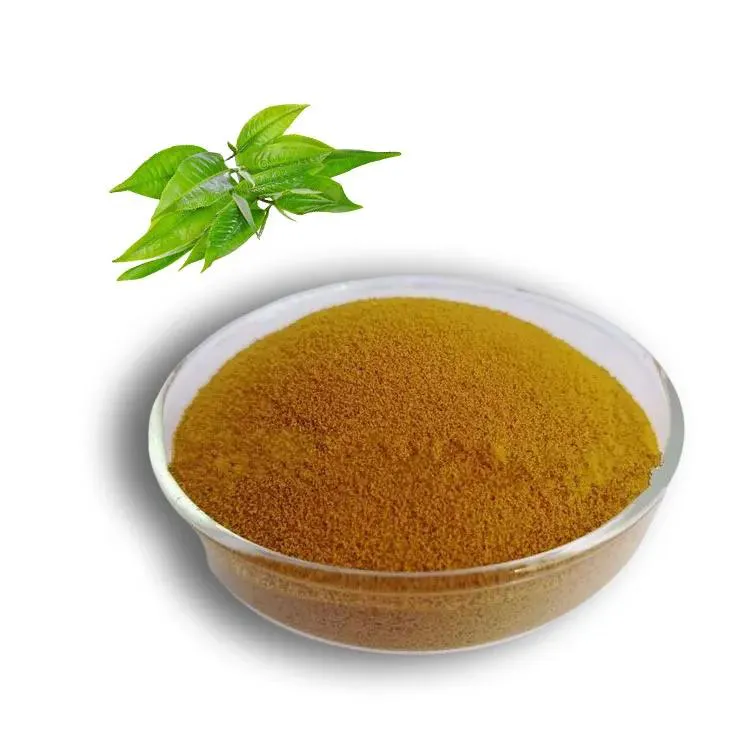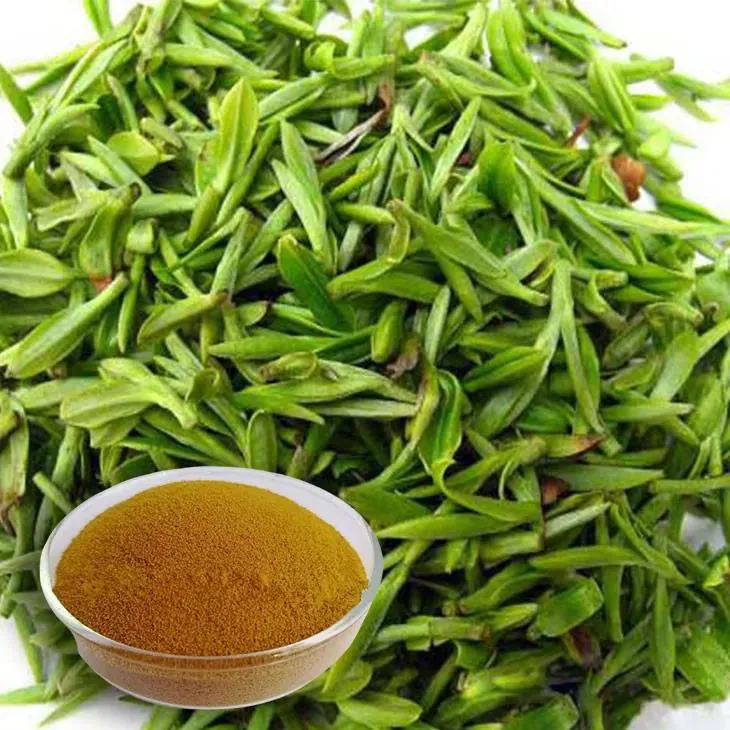- 0086-571-85302990
- sales@greenskybio.com
Green Tea Extract: Is It Really a Fat Burner?
2025-06-26

In the pursuit of effective weight loss solutions, Green Tea Extract has garnered considerable attention. Known for its numerous health benefits, green tea has been a staple in diets worldwide for centuries. The extract, concentrated from this revered beverage, is often marketed as a powerful fat burner, accelerating weight loss and aiding in body composition improvement. But does Green Tea Extract genuinely serve as an effective fat burner? This article delves into the science behind Green Tea Extract, its components, potential benefits for fat loss, and considerations for its use.
Understanding Green Tea Extract
Green tea, derived from the Camellia sinensis plant, owes its health-promoting properties to its rich content of polyphenols, particularly catechins. Green tea extract is a concentrated form of these catechins, with epigallocatechin gallate (EGCG) being the most researched and biologically active. These compounds are believed to contribute to green tea's beneficial effects by reducing inflammation, providing antioxidant protection, and, importantly for weight loss enthusiasts, potentially increasing fat burning.

Mechanisms of Action: How Might Green Tea Extract Burn Fat?
The purported fat-burning effects of green tea extract primarily revolve around several mechanisms, deeply rooted in its biochemical properties:
1. Increased Thermogenesis: Thermogenesis is the process of heat production in organisms, which can lead to increased calorie burning. The catechins in green tea extract are thought to boost thermogenesis, resulting in higher energy expenditure and enhanced fat oxidation.
2. Metabolism Boost: Green tea extract is believed to enhance metabolic rate, allowing the body to burn more calories at rest. This metabolism-boosting effect is fundamental for effective weight loss, helping to increase the total number of calories burned throughout the day.
3. Fat Oxidation: The catechins, especially EGCG, are understood to support the breakdown of fat, particularly during exercise. By promoting fat oxidation, green tea extract may help shift the body's energy source from carbohydrates to fat, leading to increased fat loss over time.
4. Improved Insulin Sensitivity: Green tea extract has been associated with improved insulin sensitivity, a critical factor in metabolic health and weight management. Enhanced insulin sensitivity can help the body more effectively use glucose for energy instead of storing it as fat.

Scientific Evidence: What Do Studies Indicate?
While the fat-burning properties of green tea extract sound promising, what does the scientific literature say about its efficacy?
1. Studies on Thermogenesis and Metabolism: Research has shown that green tea extract can promote modest increases in energy expenditure. A study published in the "American Journal of Clinical Nutrition" highlighted that green tea extract could enhance fat burning by approximately 4% in a 24-hour period. Although the increase seems small, it can contribute significantly to weight loss when combined with a healthy lifestyle.
2. Weight Loss and Body Composition: Several short-term studies have reported modest weight loss benefits from consuming green tea extract. A meta-analysis in the "International Journal of Obesity" found that catechins, in combination with caffeine present in green tea, contribute to weight loss and maintenance. However, it is essential to note the variability in study results, with some research observing no significant impact on body composition.
3. Exercise and Fat Oxidation: Some studies suggest that green tea extract can enhance fat burning during exercise. In an experiment conducted on moderately active young men, those who consumed green tea extract demonstrated a significant increase in fat oxidation rates during a cycling trial compared to those taking a placebo.

Considerations and Potential Side Effects
Despite the potential benefits, several considerations and potential side effects deserve attention:
1. Caffeine Content: Green tea extract contains caffeine, which can lead to side effects like jitteriness, insomnia, and increased heart rate, especially for individuals sensitive to caffeine. It's crucial to monitor overall caffeine intake from all sources when consuming green tea supplements.
2. Dosage Variability: The efficacy of green tea extract can vary significantly with different dosages and formulations. To achieve desired effects, it may be necessary to follow recommended dosages and consult with a healthcare provider, particularly since product concentrations can differ widely.
3. Possible Liver Damage: In rare cases, high doses of green tea extract have been linked to liver damage. It is essential to follow dosage recommendations and consult with a healthcare provider before starting any new supplement regimen.
4. Interactions with Medications: Green tea extract can interfere with certain medications, including anticoagulants and some anti-hypertensives. Consultation with a healthcare professional is advised, particularly for individuals with existing health conditions or those taking other medications.
Conclusion
While green tea extract offers promising potential as a fat burner, it is important to approach it with a balanced perspective. The scientific evidence suggests that green tea extract can contribute to increased energy expenditure, improved fat oxidation, and potentially aid in weight loss when used as part of an overall healthy lifestyle. However, the effects are generally modest, and it should not be relied upon as a sole means of weight management.
A systematic approach that includes a balanced diet, regular physical activity, and sustainable lifestyle changes should be at the core of any effective weight loss strategy. If you are considering incorporating green tea extract into your regimen, consultation with a healthcare professional can provide personalized guidance to ensure safety and maximize benefits. As researchers continue to explore the full extent of green tea extract's capabilities, it remains a valuable addition to the health-conscious individual's toolkit when used responsibly.
- ▶ Hesperidin
- ▶ Citrus Bioflavonoids
- ▶ Plant Extract
- ▶ lycopene
- ▶ Diosmin
- ▶ Grape seed extract
- ▶ Sea buckthorn Juice Powder
- ▶ Fruit Juice Powder
- ▶ Hops Extract
- ▶ Artichoke Extract
- ▶ Mushroom extract
- ▶ Astaxanthin
- ▶ Green Tea Extract
- ▶ Curcumin
- ▶ Horse Chestnut Extract
- ▶ Other Product
- ▶ Boswellia Serrata Extract
- ▶ Resveratrol
- ▶ Marigold Extract
- ▶ Grape Leaf Extract
- ▶ New Product
- ▶ Aminolevulinic acid
- ▶ Cranberry Extract
- ▶ Red Yeast Rice
- ▶ Red Wine Extract
-
Quercetin
2025-06-26
-
Baicalin
2025-06-26
-
Sugarcane Extract
2025-06-26
-
Fenugreek Extract Powder
2025-06-26
-
Plantain extract
2025-06-26
-
Lemon Balm Extract
2025-06-26
-
White Peony Extract
2025-06-26
-
Natural grape seed extract
2025-06-26
-
Bamboo Leaf extract
2025-06-26
-
Wheat Germ Extract
2025-06-26





















